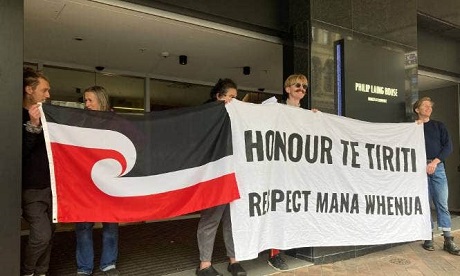Emotions ran high at an Otago Regional Council (ORC) meeting last week in a sequel to an incident involving a councillor and his alleged ‘walk-out’ response to a karakia.
One of those at the meeting last Wednesday was Alex Gorrie (Kāi Tahu, Kāti Māmoe and Waitaha), holding a large sign urging ORC to honour Te Tiriti.
He then went on to address councillors in the public forum.
He said he was concerned when he read about Cr Kevin Malcolm’s walkout, thinking “this is not good”.
The pair exchanged emails.
During the public forum, Malcolm told Gorrie he was on a different stage of the journey and would like to work with him.
‘’I’ve already got a full-time job,’’ Gorrie said, as applause broke out in the public gallery.
Far from walking out during the karakia, as has been widely reported, Malcolm said he walked out afterwards. Council minutes show this, he attested.
“At no stage did I disrespect the karakia.”
His views on the karakia are now different from those he made to Stuff news immediately after his walkout.
At that time he said “it was just a tick box exercise to try and get favour, it was just so wrong”.
ORC chair Gretchen Robertson clearly doesn’t share that view. She began Wednesday’s council meeting with a karakia. She then turned to an agenda item regarding the opening and closing of council and committee meetings.
She noted a council report about Te Ao Māori (the Māori world view) of karakia says it delineates a time and space for a specific activity/event. It clears the pathway and brings people together for a common purpose.
Although commonly translated as a “prayer”, it did not have to have religious intent.
Councillors largely spoke in support. Views varied.
One said karakia enriched meetings, and he looked forward their regular inclusion.
Another said the karakia provides a bi-cultural signal that “we were in this together” – regardless of whether or not Māori were present.
One (Michael Laws) spoke against the use of a karakia. He objects to using religion or the supernatural in council affairs.
He noted the separation of church and state came from the forebears who arrived to New Zealand in the 19th century.
Asked whose forebears he was speaking of, Laws replied his own. “Those that developed this country … the reason we have an economy today.”
He noted the council has no Māori elected members but wants to impose a karakia.
He called it “the worst kind of tokenism … the very worst kind.
“It is not simply wrong … it is risible.”
He suggested those who did not want to be present for a karakia did not need to have it imposed upon them.
Malcolm has no issue with the use of karakia, but advocated for more training.
Councillors voted to note the report, with only Laws voting against.
Source
Additional readingNews category: New Zealand.




